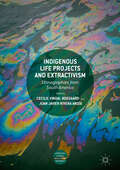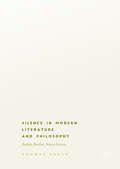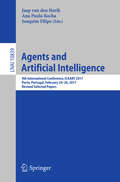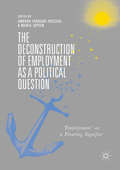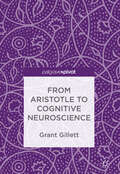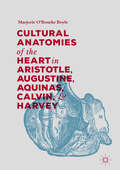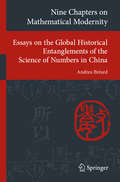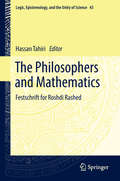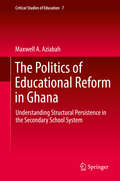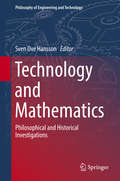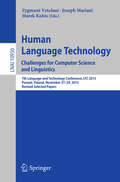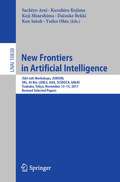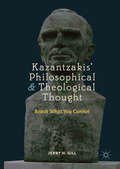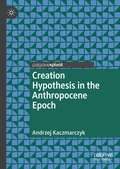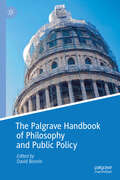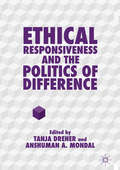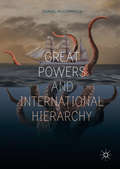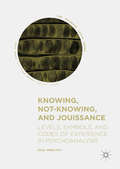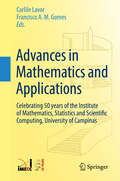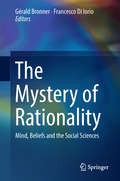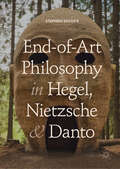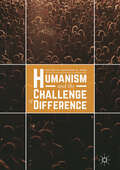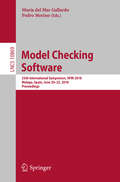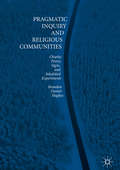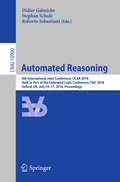- Table View
- List View
Indigenous Life Projects and Extractivism: Ethnographies from South America (Approaches to Social Inequality and Difference)
by Cecilie Vindal Ødegaard Juan Javier Rivera AndíaExploring indigenous life projects in encounters with extractivism, the present open access volume discusses how current turbulences actualise questions of indigeneity, difference and ontological dynamics in the Andes and Amazonia. While studies of extractivism in South America often focus on wider national and international politics, this contribution instead provides ethnographic explorations of indigenous politics, perspectives and worlds, revealing loss and suffering as well as creative strategies to mediate the extralocal. Seeking to avoid conceptual imperialism or the imposition of exogenous categories, the chapters are grounded in the respective authors’ long-standing field research. The authors examine the reactions (from resistance to accommodation), consequences (from anticipation to rubble) and materials (from fossil fuel to water) diversely related to extractivism in rural and urban settings. How can Amerindian strategies to preserve localised communities in extractivist contexts contribute to ways of thinking otherwise?
Silence in Modern Literature and Philosophy: Beckett, Barthes, Nancy, Stevens
by Thomas GouldThis book discusses the elusive centrality of silence in modern literature and philosophy, focusing on the writing and theory of Jean-Luc Nancy and Roland Barthes, the prose of Samuel Beckett, and the poetry of Wallace Stevens. It suggests that silence is best understood according to two categories: apophasis and reticence. Apophasis is associated with theology, and relates to a silence of ineffability and transcendence; reticence is associated with phenomenology, and relates to a silence of listenership and speechlessness. In a series of diverse though interrelated readings, the study examines figures of broken silence and silent voice in the prose of Samuel Beckett, the notion of shared silence in Jean-Luc Nancy and Roland Barthes, and ways in which the poetry of Wallace Stevens mounts lyrical negotiations with forms of unsayability and speechlessness.
Agents and Artificial Intelligence: 9th International Conference, ICAART 2017, Porto, Portugal, February 24–26, 2017, Revised Selected Papers (Lecture Notes in Computer Science #10839)
by Joaquim Filipe Jaap van den Herik Ana Paula RochaThis book contains the revised and extended versions of selected papers from the 9th International Conference, ICAART 2017, held in Porto, Portugal, in February 24-26, 2017.The 11 full papers were carefully reviewed and selected from 158 initial submissions. The papers are organized in two tracks. The first focuses on agents, multi-agent systems, software platforms, distributed problem solving and distributed AI in general. The second track focuses mainly on artificial intelligence, knowledge representation, planning, learning, scheduling, perception, reactive AI systems, evolutionary computing, and other topics related to intelligent systems and computer intelligence.
The Deconstruction of Employment as a Political Question: 'Employment' as a Floating Signifier
by Amparo Serrano-Pascual Maria JepsenThe wide-ranging European perspectives brought together in this volume aim to analyse, by means of an interdisciplinary approach, the numerous implications of a massive shift in the conception of ‘work’ and the category of ‘worker’. Changes in the production models, economic downturn and increasing digitalisation have triggered a breakdown in the terms and assumptions that previously defined and shaped the notion of employment. This has made it more difficult to discuss, and problematise, issues like vulnerability in employment in such terms as unfairness, inequality and inadequate protection. Taking the ‘deconstruction of employment’ as a central idea for theorising the phenomenon of work today, this volume explores the emergence of new semantic fields and territories for understanding and regulating employment. These new linguistic categories have implications beyond language alone: they reformulate the very concept of waged employment (including those aspects previously considered intrinsic to the meaning of work and of being ‘a worker’), along with other closely associated categories such as unemployment, self-employment, and inactivity.
From Aristotle to Cognitive Neuroscience
by Grant GillettFrom Aristotle to Cognitive Neuroscience identifies the strong philosophical tradition that runs from Aristotle, through phenomenology, to the current analytical philosophy of mind and consciousness. In a fascinating account, the author integrates the history of philosophy of mind and phenomenology with recent discoveries on the neuroscience of conscious states. The reader can trace the development of a neuro-philosophical synthesis through the work of Aristotle, Kant, Wittgenstein, Husserl, Merleau-Ponty, Brentano and Hughlings-Jackson, among others, and so explore contemporary philosophical puzzles surrounding consciousness and its relation to cerebral synchrony and connectedness. Of interest to students and scholars of neuroethics, neurophilosophy and philosophy of mind, as well as philosophy of psychiatry, From Aristotle to Neuroscience demonstrates the real essence of consciousness as it increasingly connects with philosophy, law, morality, aesthetics, and spirituality.
Cultural Anatomies of the Heart in Aristotle, Augustine, Aquinas, Calvin, and Harvey
by Marjorie O'Rourke BoyleThis book probes beneath modern scientific and sentimental concepts of the heart to discover its past mysteries. Historical hearts evidenced essential aspects of human existence that still endure in modern thought and experience of political community, psychological mentality, and physical vitality. Marjorie O’Rourke Boyle revises ordinary assumptions about the heart with original interdisciplinary research on religious beliefs and theological and philosophical ideas. Her book uncovers the thought of Aristotle, William Harvey, Augustine, Thomas Aquinas, and John Calvinas it relates to the heart. It analyzes Augustine’s outlaw heart in cultural deviance from biblical law; Aquinas’s problematic argument for the permanence of the natural law in the heart; and Calvin’s advocacy for an affective heart re-created by the Spirit from its fallen nature. This book of cultural anatomies is the climax of her dozen years of publications on the heart.
Nine Chapters on Mathematical Modernity: Essays on the Global Historical Entanglements of the Science of Numbers in China (Transcultural Research – Heidelberg Studies on Asia and Europe in a Global Context)
by Andrea BréardThe book addresses for the first time the dynamics associated with the modernization of mathematics in China from the nineteenth to the mid-twentieth century from a transcultural global historical perspective. Rather than depict the transformations of mathematical knowledge in terms of a process of westernization, the book analyzes the complex interactions between different scientific communities and the ways in which the past, modernity, language, and mathematics were negotiated in a global context. In each chapter, Andrea Bréard provides vivid portraits of a series of go-betweens (such as translators, educators, or state statisticians) based on a vast array of translated primary sources hitherto unavailable to a non-Chinese readership. They not only illustrate how Chinese scholars mediated between new mathematical objects and discursive modes, but also how they instrumentalized their autochthonous scientific roots in specific political and intellectual contexts. While sometimes technical in style, the book addresses all readers who are interested in the global and cultural history of science and the complexities involved in the making of universal mathematics. “While the pursuit of modernity is in the title, entanglement is of as much interest. Using the famous ‘Nine Chapters’ as a framework, Bréard considers a wide range of that entanglement from divination to data management. Bréard’s analysis and thought-provoking insights show once again how much we can learn when two cultures intersect. A fascinating read!” (John Day, Boston University).
The Philosophers and Mathematics: Festschrift for Roshdi Rashed (Logic, Epistemology, and the Unity of Science #43)
by Hassan TahiriThis book explores the unique relationship between two different approaches to understand the nature of knowledge, reality, and existence. It collects essays that examine the distinctive historical relationship between mathematics and philosophy. Readers learn what key philosophers throughout the ages thought about mathematics. This includes both thinkers who recognized the relevance of mathematics to their own work as well as those who chose to completely ignore its many achievements.The essays offer insight into the role that mathematics played in the formation of each included philosopher’s doctrine as well as the impact its remarkable expansion had on the philosophical systems each erected. Conversely, the authors also highlight the ways that philosophy contributed to the growth and transformation of mathematics. Throughout, significant historical examples help to illustrate these points in a vivid way. Mathematics has often been a favored interlocutor of philosophers and a major source of inspiration. This book is the outcome of an international conference held in honor of Roshdi Rashed, a renowned historian of mathematics. It provides researchers, students, and interested readers with remarkable insights into the history of an important relationship throughout the ages.
The Politics of Educational Reform in Ghana: Understanding Structural Persistence in the Secondary School System (Critical Studies of Education #7)
by Maxwell A. AziabahThis book comprises six main chapters and addresses the core research question: How can the endurance of academic bias in Ghana’s secondary education system be explained in the context of educational reform versus change of government concurrence? Six sub-questions have subsequently been derived from the core research question, enabling a comprehensive and rigorous treatment of the subject matter of investigation. The manuscript adopts an historical institutionalism approach, combining path dependency with partisan theory in explicating structural persistence in the secondary school system in Ghana. A case study methodological design procedure has been employed in the investigation of three episodes of educational reform, anchored on qualitative content analysis as the main data reduction mechanism.
Technology and Mathematics: Philosophical and Historical Investigations (Philosophy of Engineering and Technology #30)
by Sven Ove HanssonThis volume is the first extensive study of the historical and philosophical connections between technology and mathematics. Coverage includes the use of mathematics in ancient as well as modern technology, devices and machines for computation, cryptology, mathematics in technological education, the epistemology of computer-mediated proofs, and the relationship between technological and mathematical computability. The book also examines the work of such historical figures as Gottfried Wilhelm Leibniz, Charles Babbage, Ada Lovelace, and Alan Turing.
Human Language Technology. Challenges for Computer Science and Linguistics: 7th Language and Technology Conference, LTC 2015, Poznań, Poland, November 27-29, 2015, Revised Selected Papers (Lecture Notes in Computer Science #10930)
by Joseph Mariani Zygmunt Vetulani Marek KubisThis book constitutes the refereed proceedings of the 7h Language and Technology Conference: Challenges for Computer Science and Linguistics, LTC 2015, held in Poznan, Poland, in November 2015. The 31 revised papers presented in this volume were carefully reviewed and selected from 108 submissions. The papers selected to this volume belong to various fields of: Speech Processing; Multiword Expressions; Parsing; Language Resources and Tools; Ontologies and Wordnets; Machine Translation; Information and Data Extraction; Text Engineering and Processing; Applications in Language Learning; Emotions, Decisions and Opinions; Less-Resourced Languages.
New Frontiers in Artificial Intelligence: JSAI-isAI Workshops, JURISIN, SKL, AI-Biz, LENLS, AAA, SCIDOCA, kNeXI, Tsukuba, Tokyo, November 13-15, 2017, Revised Selected Papers (Lecture Notes in Computer Science #10838)
by Ken Satoh Daisuke Bekki Koji Mineshima Yuiko Ohta Sachiyo Arai Kazuhiro KojimaThis book constitutes extended, revised and selected papers from the 9th International Symposium of Artificial Intelligence supported by the Japanese Society for Artificial Intelligence, JSAI-isAI 2017. It was held in November 2017 in Tokyo, Japan. The 22 papers were carefully selected from 109 submissions and are organized in sections on juris-informatics, skill science, artificial intelligence of and for business, logic and engineering of natural language semantics, argument for agreement and assurance, scientific document analysis, knowledge explication for industry.
Kazantzakis’ Philosophical and Theological Thought: Reach What You Cannot
by Jerry H. GillThis book explores the philosophical and theological thought of Nikos Kazantzakis. Kazantzakis is a well-known and highly influential Greek writer, having authored such works as Zorba the Greek and The Last Temptation of Christ, among many others. This volume focuses on the over-arching themes of Kazantzakis’ work, namely the importance of the natural world, the nature of humanity, and the nature of God, by means of an analysis of his major novels and other writings. Along the way attention is given to the views of the important scholars who have interacted with Kazantzakis’s works, including Peter Bien, Darren Middleton, and Daniel Dombrowski.
Creation Hypothesis in the Anthropocene Epoch
by Andrzej KaczmarczykThis book is a discourse on creation hypothesis in light of new scientific findings made in the 20th and 21st centuries, incorporating sacred texts of different religions. It also addresses the universal phenomena of information and mathematics within this context. The discourse makes an important contribution to the ongoing conversation about creationism, intelligent design, and the problems of science vs. religion.
The Palgrave Handbook of Philosophy and Public Policy
by David BooninThis book brings together a large and diverse collection of philosophical papers addressing a wide variety of public policy issues. Topics covered range from long-standing subjects of debate such as abortion, punishment, and freedom of expression, to more recent controversies such as those over gene editing, military drones, and statues honoring Confederate soldiers. Part I focuses on the criminal justice system, including issues that arise before, during, and after criminal trials. Part II covers matters of national defense and sovereignty, including chapters on military ethics, terrorism, and immigration. Part III, which explores political participation, manipulation, and standing, includes discussions of issues involving voting rights, the use of nudges, and claims of equal status. Part IV covers a variety of issues involving freedom of speech and expression. Part V deals with questions of justice and inequality. Part VI considers topics involving bioethics and biotechnology. Part VII is devoted to beginning of life issues, such as cloning and surrogacy, and end of life issues, such as assisted suicide and organ procurement. Part VIII navigates emerging environmental issues, including treatments of the urban environment and extraterrestrial environments.
Ethical Responsiveness and the Politics of Difference
by Anshuman A. Mondal Tanja DreherThis edited collection focuses on the ethics, politics and practices of responsiveness in the context of racism, inequality, difference and controversy. The politics of difference has long been concerned with speech, voice and representation. By focusing on the practices and politics of responsiveness—listening, reading and witnessing—the volume identifies vital new possibilities for ethics and social justice. Chapters focus on the conditions of possibility, or listening as ethical praxis; unsettling or disrupting colonial relationships; and ways of listening that highlight non-Western traditions and move beyond the liberal frame. Ethical responsiveness shifts some of the responsibility for negotiating difference and more just futures from subordinated speakers, and on to the relatively more privileged and powerful.
Great Powers and International Hierarchy
by Daniel McCormackHierarchical relationships—rules that structure both international and domestic politics—are pervasive. Yet we know little about how these relationships are constructed, maintained, and dismantled. This book fills this lacuna through a two-pronged research approach: first, it discusses how great power negotiations over international political settlements both respond to domestic politics within weak states and structure the specific forms that hierarchy takes. Second, it deduces three sets of hypotheses about hierarchy maintenance, construction, and collapse during the post-war era. By offering a coherent theoretical model of hierarchical politics within weaker states, the author is able to answer a number of important questions, including: Why does the United States often ally with autocratic states even though its most enduring relationships are with democracies? Why do autocratic hierarchical relationships require interstate coercion? Why do some hierarchies end violently and others peacefully? Why does hierarchical competition sometimes lead to interstate conflict and sometimes to civil conflict?
Knowing, Not-Knowing, and Jouissance: Levels, Symbols, And Codes Of Experience In Psychoanalysis (The\palgrave Lacan Ser.)
by Raul MoncayoThis book explores the practice and transmission of Lacanian and Freudian theory. It discusses the pure versus applied analysis of Lacanian and Freudian theory in practice; and the hierarchical versus circular transmissions within psychoanalytic organizations.Underpinned by extensive practical knowledge of the clinic, this work examines the differences between Freud and Lacan in their understanding of the subject and the unconscious and pushes them in new directions. The book also offers an analysis and commentary of several key Lacanian texts including an accessible study of the notoriously challenging text L'etourdit. Offering both divergent and reinforcing takes on Lacan, the author explores the traits that separate out the psychoanalyst from other twentieth-century thinkers and theorists. This book offers a clear clinical picture of where Lacanian psychoanalysis is today, both in the US and internationally.
Advances in Mathematics and Applications: Celebrating 50 years of the Institute of Mathematics, Statistics and Scientific Computing, University of Campinas
by Carlile Lavor Francisco A. GomesThis book celebrates the 50th anniversary of the Institute of Mathematics, Statistics and Scientific Computing (IMECC) of the University of Campinas, Brazil, by offering reviews of selected research developed at one of the most prestigious mathematics institutes in Latin America. Written by senior professors at the IMECC, it covers topics in pure and applied mathematics and statistics ranging from differential geometry, dynamical systems, Lie groups, and partial differential equations to computational optimization, mathematical physics, stochastic process, time series, and more. A report on the challenges and opportunities of research in applied mathematics - a highly active field of research in the country - and highlights of the Institute since its foundation in 1968 completes this historical volume, which is unveiled in the same year that the International Mathematical Union (IMU) names Brazil as a member of the Group V of countries with the most relevant contributions in mathematics.
The Mystery of Rationality: Mind, Beliefs and the Social Sciences (Lecture Notes in Morphogenesis)
by Gérald Bronner Francesco Di IorioThis book contributes to the developing dialogue between cognitive science and social sciences. It focuses on a central issue in both fields, i.e. the nature and the limitations of the rationality of beliefs and action. The development of cognitive science is one of the most important and fascinating intellectual advances of recent decades, and social scientists are paying increasing attention to the findings of this new branch of science that forces us to consider many classical issues related to epistemology and philosophy of action in a new light. Analysis of the concept of rationality is a leitmotiv in the history of the social sciences and has involved endless disputes. Since it is difficult to give a precise definition of this concept, and there is a lack of agreement about its meaning, it is possible to say that there is a ‘mystery of rationality’. What is it to be rational? Is rationality merely instrumental or does it also involve the endorsement of values, i.e. the choice of goals? Should we consider rationality to be a normative principle or a descriptive one? Can rationality be only Cartesian or can it also be argumentative? Is rationality a conscious skill or a partly tacit one? This book, which has been written by an outstanding collection of authors, including both philosophers and social scientists, tries to make a useful contribution to the debates on these problems and shed some light on the mystery of rationality. The target audience primarily comprises researchers and experts in the field.
End-of-Art Philosophy in Hegel, Nietzsche and Danto
by Stephen SnyderThis book examines the little understood end-of-art theses of Hegel, Nietzsche, and Danto. The end-of-art claim is often associated with the end of a certain standard of taste or skill. However, at a deeper level, it relates to a transformation in how we philosophically understand our relation to the ‘world’. Hegel, Nietzsche, and Danto each strive philosophically to overcome Cartesian dualism, redrawing the traditional lines between mind and matter. Hegel sees the overcoming of the material in the ideal, Nietzsche levels the two worlds into one, and Danto divides the world into representing and non-representing material. These attempts to overcome dualism necessitate notions of the self that differ significantly from traditional accounts; the redrawn boundaries show that art and philosophy grasp essential but different aspects of human existence. Neither perspective, however, fully grasps the duality. The appearance of art’s end occurs when one aspect is given priority: for Hegel and Danto, it is the essentialist lens of philosophy, and, in Nietzsche’s case, the transformative power of artistic creativity. Thus, the book makes the case that the end-of-art claim is avoided if a theory of art links the internal practice of artistic creation to all of art’s historical forms.
Humanism and the Challenge of Difference
by Anthony B. PinnThis book explores the implication of diversity for humanism. Through the insights of academics and activists, it highlights both the successes and failures related to diversity marking humanism in the US and internationally. It offers a timely depiction of how humanism in general as well as how particular humanist communities have wrestled with the nature of our changing world, and the issues that surface in relationship to markers of difference.
Model Checking Software: 25th International Symposium, SPIN 2018, Malaga, Spain, June 20-22, 2018, Proceedings (Lecture Notes in Computer Science #10869)
by Pedro Merino María Del GallardoThis book constitutes the refereed proceedings of the 25th International Symposium on Model Checking Software, SPIN 2018, held in Malaga, Spain, in June 2018.The 14 papers presented, 1 short paper, and 1 demo-tool paper, were carefully reviewed and selected from 28 submissions. Topics covered include formal verification techniques for automated analysis of software; formal analysis for modeling languages, such as UML/state charts; formal specification languages, temporal logic, design-by-contract; model checking, automated theorem proving, including SAT and SMT; verifying compilers; abstraction and symbolic execution techniques; and much more.
Pragmatic Inquiry and Religious Communities: Charles Peirce, Signs, and Inhabited Experiments
by Brandon Daniel-HughesThis book examines the ways in which religious communities experimentally engage the world and function as fallible inquisitive agents, despite frequent protests to the contrary. Using the philosophy of inquiry and semiotics of Charles Sanders Peirce, it develops unique naturalist conceptions of religious meaning and ultimate orientation while also arguing for a reappraisal of the ways in which the world’s venerable religious traditions enable novel forms of communal inquiry into what Peirce termed “vital matters.” Pragmatic inquiry, it argues, is a ubiquitous and continuous phenomenon. Thus, religious participation, though cautiously conservative in many ways, is best understood as a variety of inhabited experimentation. Religious communities embody historically mediated hypotheses about how best to engage the world and curate networks of semiotic resources for rendering those engagements meaningful. Religions best fulfill their inquisitive function when they both deploy and reform their sign systems as they learn better to engage reality.
Automated Reasoning: 9th International Joint Conference, IJCAR 2018, Held as Part of the Federated Logic Conference, FloC 2018, Oxford, UK, July 14-17, 2018, Proceedings (Lecture Notes in Computer Science #10900)
by Stephan Schulz Didier Galmiche Roberto SebastianiThis book constitutes the refereed proceedings of the 9th International Joint Conference on Automated Reasoning, IJCAR 2018, held in Oxford, United Kingdom, in July 2018, as part of the Federated Logic Conference, FLoC 2018. In 2018, IJCAR unites CADE, TABLEAUX, and FroCoS, the International Symposium on Frontiers of Combining Systems, and, for the fourth time, is part of the Federated Logic Conference.The 38 revised full research papers and 8 system descriptions presented together with two invited talks were carefully reviewed and selected from 108 submissions. The papers focus on topics such as logics, deductive systems, proof-search methods, theorem proving, model checking, verification, formal methods, and program analysis.
